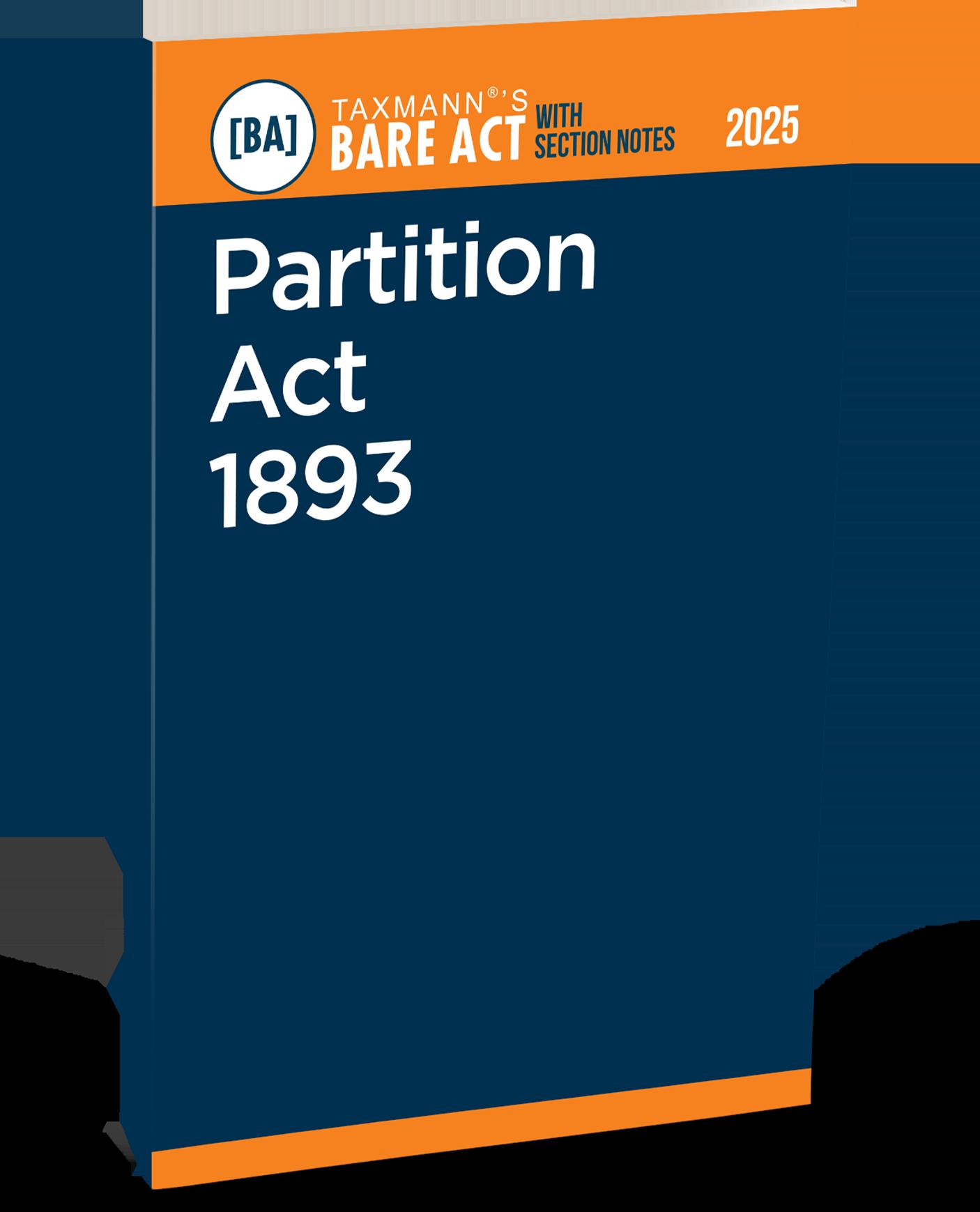© Taxmann Price : ` 85
Published by :
Taxmann Publications (P.) Ltd.
Sales & Marketing : 59/32, New Rohtak Road, New Delhi-110 005 India
Phone : +91-11-45562222
Website : www.taxmann.com
E-mail : sales@taxmann.com
Regd. Office : 21/35, West Punjabi Bagh, New Delhi-110 026 India
Printed at :
Tan Prints (India) Pvt. Ltd.
44 Km. Mile Stone, National Highway, Rohtak Road Village Rohad, Distt. Jhajjar (Haryana) India
E-mail : sales@tanprints.com
Disclaimer
Every effort has been made to avoid errors or omissions in this publication. In spite of this, errors may creep in. Any mistake, error or discrepancy noted may be brought to our notice which shall be taken care of in the next edition. It is notified that neither the publisher nor the author or seller will be responsible for any damage or loss of action to any one, of any kind, in any manner, therefrom. It is suggested that to avoid any doubt the reader should cross-check all the facts, law and contents of the publication with original Government publication or notifications.
No part of this book may be reproduced or copied in any form or by any means [graphic, electronic or mechanical, including photocopying, recording, taping, or information retrieval systems] or reproduced on any disc, tape, perforated media or other information storage device, etc., without the written permission of the publishers. Breach of this condition is liable for legal action.
For binding mistake, misprints or for missing pages, etc., the publisher’s liability is limited to replacement within seven days of purchase by similar edition. All expenses in this connection are to be borne by the purchaser. All disputes are subject to Delhi jurisdiction only.
Partition Act, 1893
[4 OF 1893]1
An Act to amend the law relating to Partition.
WHEREAS it is expedient to amend the law relating to partition; it is hereby enacted as follows:—
Title, extent and saving.
1. (1) This Act may be called the Partition Act, 18932.
(2) It extends to the whole of India 3[***] 4[***].
(3) 5[***]
(4) But nothing herein contained shall be deemed to affect any local law providing for the partition of immovable property paying revenue to Government. Power to Court to order sale instead of division in partition suits.
2. Whenever in any suit for partition in which, if instituted prior to the commencement of this Act, a decree for partition might have been made, it appears to the Court that, by reason of the nature of the property to which the suit relates, or of the number of the shareholders therein, or of any other special circumstance, a division of the property cannot reasonably or conveniently be made, and that a sale of the property and distribution of the proceeds would be more beneficial for all the shareholders, the Court may, if it thinks fit, on the request of any of such shareholders interested individually or collectively to the extent of one moiety or upwards, direct a sale of the property and a distribution of the proceeds.
1. Dated 9-3-1893.
2. The Act has been extended to—
(1) Dadra and Nagar Haveli (w.e.f. 1-7-1965) by Regulation 6 of 1963, section 2 and Sch. I. (2) Pondicherry by the Pondicherry (Extension of Laws) Act, 1968 w.e.f. 24-5-1968.
(3) Sikkim, w.e.f. 1-9-1984, vide Notification No. S.O. 651(E), dated 24-8-1984.
3. Words “except the State of Jammu and Kashmir” omitted by the Jammu and Kashmir Reorganisation Act, 2019, w.e.f. 31-10-2019. Earlier, the quoted words were substituted for “except Part B States” by the Part B States (Laws) Act, 1951, w.e.f. 1-4-1951.
4. Word “and” omitted by the Repealing and Amending Act, 1914.
5. Omitted by the Repealing and Amending Act, 1914.
COMMENTS
CASE LAWS
Improper direction without application under section 2 - The appellant, a partner in a rm that had leased part of its land to the respondent for building a cinema, later sought partition of his enlarged share in the rm’s property after acquiring more shares. The respondent, who had acquired a majority of the partners’ shares through sale deeds following an alleged oral agreement, also led for speci c performance of the agreement against remaining sellers. The High Court decreed speci c performance in the respondent’s favour and directed that, in the nal partition, the portion of land with the cinema should be allotted to the respondent if possible. However, the Supreme Court found this direction improper as there was no application under section 2 of the Partition Act by the respondent to justify such a preferential allotment. The Court held that the High Court exceeded its jurisdiction by modifying the preliminary decree without a proper application and without invoking the statutory mechanism under the Partition Act, and ordered deletion of the direction regarding allotment of the cinema site to the respondent — Kollipara Sriramulu (Dead) by L.R. v. T. Aswatha Narayana (Dead) by L.Rs. AIR 1968 SUPREME COURT 1028.
Procedure when shares undertakes to buy.
3. (1) If, in any case in which the Court is requested under the last foregoing section to direct a sale, any other shareholder applies for leave to buy at a valuation the share or shares of the party or parties asking for a sale, the Court shall order a valuation of the share or shares in such manner as it may think fit and offer to sell the same to such shareholder at the price so ascertained, and may give all necessary and proper directions in that behalf.
(2) If two or more shareholders severally apply for leave to buy as provided in sub-section (1), the Court shall order a sale of the share or shares to the shareholder who offers to pay the highest price above the valuation made by the Court.
(3) If no such shareholder is willing to buy such share or shares at the price so ascertained, the applicant or applicants shall be liable to pay all costs of or incident to the application or applications.
COMMENTS
CASE LAWS
Sale con rmed in favour of majority shareholder in possession - In a partition suit, the plaintiff, Punjab National Bank, held a dominant 83/124 share in the suit property and was in possession of a signi cant portion. A preliminary decree was passed in 1977, declaring the shares of all co-owners. Subsequently, after multiple valuation exercises and a public sale order, the plaintiff’s bid was accepted and the High Court con rmed the sale to it for ` 1,06,42,000. However, an assignee of some co-sharers who had acquired shares after the preliminary decree later offered higher bids, including ` 2 crores, prompting the High Court to set aside the earlier con rmation and direct sale to the assignee. The Supreme Court held that once the sale was con rmed with consent and the purchaser was a majority shareholder already in possession, the belated higher offer by an outsider-assignee could not unsettle a concluded transaction. Invoking section 3’s spirit and its own powers under Article 142, the Court restored the sale to the plaintiff-bank at the revised higher offer of ` 2,01,00,000, holding it just
and equitable to grant the purchase right to the larger shareholder rather than to a late coming assignee — Punjab National Bank v. Sahujain Charitable Society AIR 2007
SUPREME COURT 2651.
Valuation Dispute in share purchase under section 3 - Following a compromise decree declaring equal shares among six co-owners of a property comprising land and a two-storeyed building, three of the parties owning half the property applied for a public auction under section 2 of the Partition Act. In response, one co-owner, in possession of the property, invoked section 3 seeking to purchase the other shares at a valuation. The Single Judge initially directed sale by public auction, but the High Court reversed this, upholding the co-owner’s right to buy under section 3. On appeal, the Supreme Court con rmed that once a party invokes section 3 to buy others’ shares, the property need not be auctioned to determine its value. The Court approved a neutral valuation method combining depreciated building value with current land market value. It rejected the respondent’s contention to reduce the value or demand auction after seeking purchase rights under section 3. The Court xed the market value at ` 4.92 lakhs and allowed the respondent to buy the others’ shares accordingly. If he failed to deposit ` 4.10 lakhs, the appellants were permitted to buy his and another party’s share for ` 2 lakhs — Dr. Kishore Chand Kapoor v. Dharam Pal Kapoor AIR 1987 SUPREME COURT 66.
Precondition for sale – Absence of request bars application of section 3 - In a suit for partition of a small jointly owned property, the plaintiffs, who held a 13/16 share, proposed to buy out the defendant’s 3/16 share if partition was found unfeasible. Conversely, the defendant offered to purchase the plaintiffs’ share. The Trial Court held the property was indivisible and conducted an auction between the parties, ultimately con rming sale to the plaintiffs. On appeal, the High Court held the plaintiffs’ pleadings invoked section 2 of the Partition Act and thus allowed the defendant to purchase the plaintiffs’ share under section 3. However, the Supreme Court reversed this, holding that the conditions precedent to invoke section 3—speci cally, a request by a shareholder for public sale under section 2—were absent. The plaintiffs had only offered to buy the defendant’s share, not requested a public sale. Since neither party invoked section 2 properly, section 3 could not be triggered. Instead, applying equitable principles outside the Act, the Court held the defendant—a minor co-sharer in possession—should be given preferential right to retain the whole property on paying fair compensation, with value determined based on current market rates. The case was remanded for valuation — Badri Narain Prasad Choudhary v. Nil Ratan Sarkar AIR 1978 SUPREME COURT 845.
Relevant date for valuation under section 3 - In a suit for partition, the plaintiffs sought sale of properties asserting they were indivisible and that distributing sale proceeds would be more bene cial. The defendants, admitting their 1/3rd share, promptly expressed willingness to purchase the plaintiffs’ 2/3rd share at a valuation and sought leave of the Court under section 3 of the Partition Act. Although proceedings were prolonged due to an unsuccessful amendment attempt by the plaintiffs, the key issue arose regarding the date at which the valuation of the shares should be determined. The Bombay High Court Division Bench ruled that valuation must be as on the date of preliminary decree. The Supreme Court reversed this, holding that the right under section 3 crystallizes the moment a shareholder applies for leave to buy the others’ shares after a request for sale is made under section 2. Therefore, valuation must be based on the date this right arises, not delayed by procedural developments or the passing of a preliminary decree. The Supreme Court restored the single Judge’s ruling that valuation must be pegged to July 5, 1972, when the defendants sought leave to buy — Mrs. Malati Ramchandra Raut v. Mahadevo Vasudeo Joshi AIR 1991 SUPREME COURT 700.
Vested right to purchase share - Bar on withdrawal - In a suit for partition led by a co-owner of Odeon Cinema, the plaintiff sought a sale of the property on the ground that it could not be conveniently divided. The defendant, opposing the sale,
PARTITION ACT 1893 – BARE ACT WITH SECTION NOTES
AUTHOR : TAXMANN'S EDITORIAL BOARD
PUBLISHER : TAXMANN
DATE OF PUBLICATION : JULY 2025
EDITION : 2025 EDITION
ISBN NO : 9789371263528
NO. OF PAGES : 20
BINDING TYPE : PAPERBACK
DESCRIPTION
Partition Act 1893 [Bare Act with Section Notes] by Taxmann is an authoritative reference to the law governing the partition of immovable property among co-owners in India. The 2025 Edition brings together the complete, updated statutory text with detailed section notes, expert commentary, and a selection of key judicial decisions. This reference is designed for practical use, providing clear interpretations, procedural insights, and landmark Supreme Court precedents to aid both compliance and litigation. This book is intended for the following audience:
• Legal Practitioners, Judges, and Law Firms
• Academics and Law Students
• Property Owners, Real Estate Professionals, and Heirs
• Courts and Quasi-Judicial Authorities
The Present Publication is the 2025 Edition, covering the amended and updated text of the Partition Act [Act No. 4 of 1893], with the following noteworthy features:
• [Complete, Amended Statutory Text] Full, updated text of the Partition Act 1893, including all amendments and its applicability throughout India
• [Pre-amendment Provisions] Footnotes capture pre-amendment text for a clear understanding of legislative changes and their historical context
• [Section-wise Notes & Commentary] Concise notes clarify legal provisions, procedural steps, and important judicial principles
• [Curated Case Law] Summaries of notable Supreme Court and High Court rulings, illustrating key points and practical application
• [Latest Jurisprudence] Incorporates recent judgments to ensure up-to-date guidance for practitioners and students
• [Practical Compliance Insights] Clear instructions on procedures, valuation, and the rights of co-sharers
• [User-friendly Format] Includes a subject index, clear headings, and margin notes for easy navigation and quick reference





